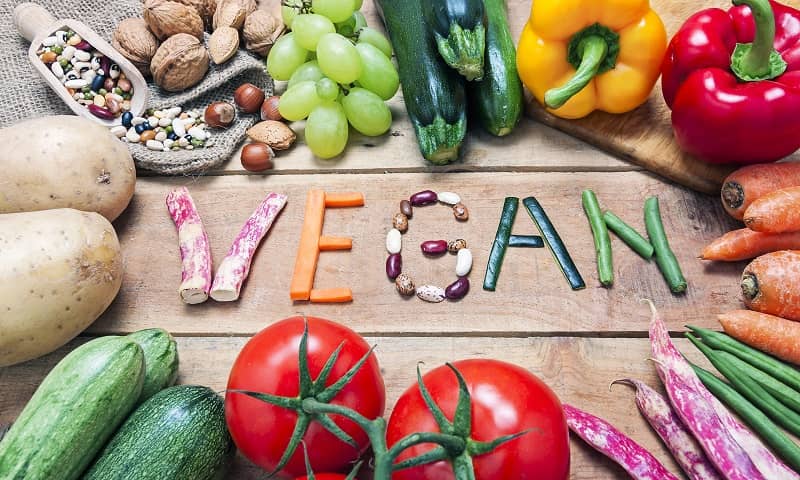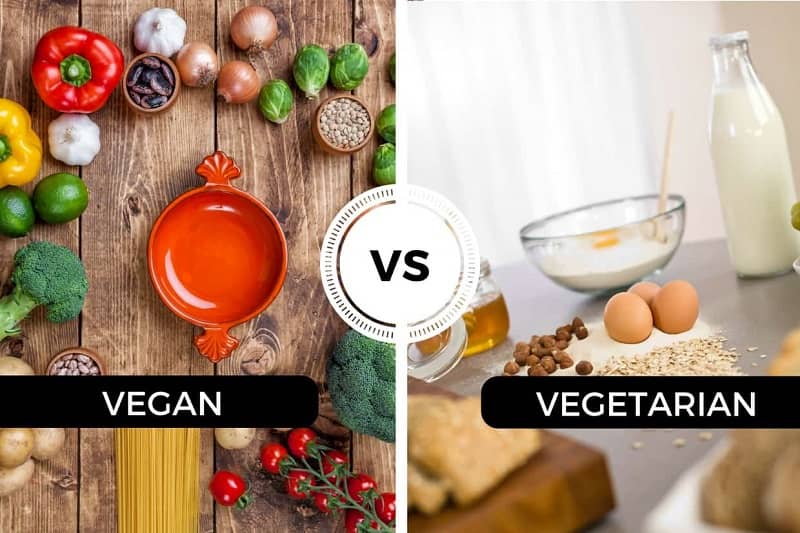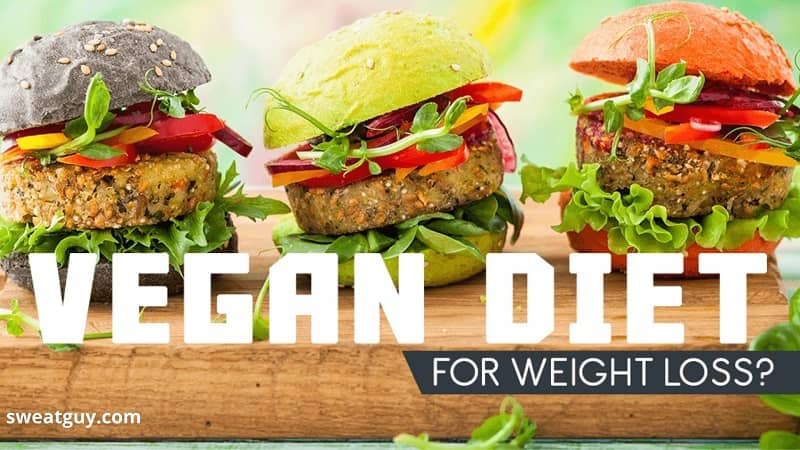Recently, veganism has become immensely popular. Here comes the trend of a vegan diet for weight loss.
Initially, popularized by American stars and celebrities with shocking weight loss results, the diet plan is what people only seek.
A vegan diet for weight loss has increasingly become familiar to everyone. In fact, scientific findings indicate its ability to lower the risk of chronic disease and even supports weight loss.
Other reason includes an ethical, eco-friendly, and healthy way of living.
When the diet is done rightly, it can get you various health benefits. The best part is the slimmer waistline and drops on the scale.
Nonetheless, a vegan diet is basically a plant-based diet. Hence, in some cases, it can lead to serious nutrient deficiencies.
Proper knowledge is necessary for a rightly employed vegan diet.
Thus, we have shared a detailed beginner’s guide to the vegan diet.
What Is the Vegan Diet?

Veganism is a way of living excluding every type of animal exploitation and cruelty.
In fact, it doesn’t limit to food only but clothing or any other requirement.
This is why; vegan diet excludes animal products including eggs, meat, and even dairy. Reasons can be many for going for the diet plan.
Mainly, people go vegan due to environmental concerns and ethics.
However, relying on the diet can actively make you healthier.
Certainly, this is the reason behind the celebs going vegan and even the normal folk.
Often Vegan Diet is confused with vegetarian diet plans. With a thin line difference, confusion and interchange of the word are common.
Here’s the difference between veganism and vegetarianism.
Vegan vs. Vegetarians

Vegans and vegetarians both meal plans exclude eating meat.
Where vegetarians just remove meat from their diet plans. Veganism can be stricter.
It is an Average Weight Loss on a Plant-Based Diet. In fact, dairy, eggs, honey, and other animal-derived byproducts including leather and silk are prohibited.
In short, veganism is entirely an ethical lifestyle supporting ecology. The best part is it makes you healthier than you think.
Obviously, there is something about eating habits making it popular.
So, let’s check for more in terms of a vegan diet for weight loss.
Different Types of Vegan Diets
There are different varieties of vegan diets. The most common include:
Whole-food vegan diet:
The diet plan relies completely on whole plant foods. The list includes veggies, legumes, seeds, fruits, wholegrain, and nuts.
Raw-food vegan diet
The diet plan only has raw food items for consumption. The food includes raw veggies, fruits, seeds, nuts, or plant foods prepared at a temp below 118°C.
80/10/10
The 80/10/10 diet is basically a raw food-based vegan diet.
The diet plan entirely limits fat-rich plants mainly including foods like nuts and avocados.
Further, it depends on the consumption of raw fruits and soft green.
In fact, the diet is also referred to as the low-fat, raw-food vegan diet, or fruitarian diet.
The starch solution
The low fat, high carbon vegan diet is exactly like l the 80/10/10.
In short, it means the diet completely relies on cooked starches like rice, potatoes, and corn instead of fruit.
Raw till 4
This low-fat diet plan is again inspired by the 80/10/10 and starch solution. In this vegan diet plan, the consumption of raw foods goes on until 4 p.m.
Interestingly, the option of a cooked plant relied on meals for dinner.
The thrive diet
The thrive diet is again a raw food eating plan. Followers have mainly plant-based, whole foods.
These are raw or minimally prepared at low temp.
Junk-food vegan diet
A vegan diet inadequate in whole plant-based food depending heavily on junk food.
The list includes fries, vegan desserts, mock meat and cheese, and other heavily processed vegan foods
Certainly, many variations of the vegan diet plan are available. Still, the scientifically proven ones rarely differ from different kinds of a vegan diet.
Following the diet can be helpful whatever ways of the diet plan you stick with.
However, are the Vegan Diet Weight Loss Results true? Let’s find it in the next segment…
Vegan Diets Can Help You Lose Weight

Naturally, vegans are thinner and have a comparatively lower BMI than non-vegans.
Certainly, this explanation is the reason behind the increasing numbers of people going vegan to shut off excess weight.
Other advantages of vegan can be expla9ined for different factors than a diet. These can be healthier lifestyle choices like workouts, physical activity, and other healthy behaviors.
Nonetheless, many random regulated studies to find the effect of the external aspects has surprising facts to share.
The findings suggest the effectiveness of a vegan diet for weight loss is higher than other diets.
Surprisingly, the weight loss benefits remain the same even when switched to controlled whole-food-based diets.
In fact, the American Dietetics Association (ADA), the American Heart Association (AHA), and the National Cholesterol Education Program (NCEP) highly recommend a vegan diet.
Interestingly, vegan diet followers lose more weight than calorie-restricted dieters.
The results are the same even when are allowed to eat until they are full.
Of course, vegan diets for weight loss immensely beneficial.
Apart from weight loss, the diet plan has much more to offer.
Health Benefits of Vegan Diets
Every eating style has its own advantages; this is true with vegan diets also.
In fact, following a specific eating style employs you to specific nutrition and nourishment.
Evidently, in long run, following vegan diet subjects to an array of incredible health benefits.
The long list of Vegan diet benefits include:
- Cancer risk: Going vegan might lower the risk of cancer by 15%.
- Arthritis: Following a vegan diet can be effective in lessening the sign of arthritis. This mainly includes pain, joint swelling, and morning stiffness.
- Kidney function: Diabetics who have plant protein instead of meat have a lower risk for poor kidney functions.
- Alzheimer’s disease: Observational studies indicate a vegan diet may aid in lessening the development of Alzheimer’s disease.
The studies might suggest amazing facts. However, these benefits are observational only.
Hence, it is challenging to determine if the vegan diet worth in this case for real or not.
Moreover, stronger and longer studies are required for sound facts.
Next, following vegan diets for weight loss involving eating the right food and excluding the wrong ones.
So, let’s get to our list of food to avoid.
Foods to Avoid
Fast Vegan Weight Loss involves the consumption of plants based food only.
Thus, the avoid list has all the animal foods, even the food encompassing animal-derived ingredients.
The food to avoid list goes like this:
- Eggs: From quails, chickens, fish, ostriches, etc.
- Bee products: Bee pollen, honey, royal jelly, etc.
- Dairy: Milk, cheese, yogurt, butter, ice cream, cream, etc.
- Meat and poultry: lamb, veal, organ meat, beef, pork, wild meat, horse, chicken, duck, goose, quail, turkey, etc.
- Fish and seafood: All kinds of fish, anchovies, squid, shrimp, scallops, mussels, calamari, lobster, crab, etc.
- Animal-based ingredients: Whey, lactose, casein, gelatin, egg white albumen, isinglass, shellac, cochineal or carmine, L-cysteine, animal-originated vitamin D3, and fish- originated omega-3 fatty acids.
These were the most excluded food items from your diet.
Apart from that, avoid any eatable derived from animals to stick to the vegan diet plan for weight loss.
Next, jump to food to add a list.
Foods to Eat
The vegan diet entirely relies on plant-based food substitutes for plant-based replacements.
Hence, for a proper diet, knowing these foods are necessary.
The foods to eat list includes:
Tofu, tempeh, and seitan
These are a flexible protein-rich substitute for fish, meat, poultry, and eggs in many recipes.
Algae
Spirulina and chlorella are decent sources of complete protein. Whereas other algae variety is an amazing source of iodine.
Nuts and nut butter
Particularly unbalanced and unroasted assortments of nuts are a good source of nutrients and minerals. This includes fiber, iron, zinc, magnesium, selenium, and vitamin E.
Seeds
Specifically, chia, hemp, and flaxseeds are good. These encompass an enthralling quantity of protein and valuable omega-3 fatty acids.
Nutritional yeast
This is the best and easiest way to get more protein quantity of vegan food while adding cheesy flavor. Moreover, always go for B12-fortified varieties of nutritional yeast, if possible.
Fruits and vegetables
Whether it comes to nutrition or tastes, both foods are the greatest. Leafy greens such as spinach, bok choy, watercress, kale, and mustard greens are chiefly high in iron and calcium.
Legumes
Foodstuffs such as lentils, beans, and peas are outstanding sources of several nutrients and valuable plant compounds. Sprouting, fermenting and appropriate cooking can multiply nutrient absorption.
Calcium-fortified plant milk and yogurts
These food items help vegans attain their suggested dietary calcium consumptions. Go for plant milk and yogurts ranges also fortified with vitamins B12 and D if possible.
Whole grains, cereals, and pseudocereals
These are prominent sources of complex fiber, carbs, iron, B-vitamins, and other beneficial minerals. Teff, spelled, amaranth and quinoa are particularly high-protein alternatives.
Sprouted and fermented plant foods
Ezekiel bread, miso, tempeh, sauerkraut, natto, pickles, kombucha, and kimchi oftentimes have probiotics and vitamin K2. When these foods go for sprouting and fermenting help, advance mineral absorption.
Including these minimally processed plant foods are great for health.
In long run, the vegan diet plan curated out of the above-shared meal idea can be highly beneficial.
However, restrictive intakes of food can lead to a deficiency of minerals. Hence, you might require some supplements.
So, let’s check it out…
Supplements to Consider
Going vegan might not go good for everyone
In fact, not everyone likes the food options people are going for.
Evidently, getting used to eating a sufficient quantity of nutrient-rich or fortified foods to meet the daily needed quantity is tough.
Hence, people are likely to get a deficiency of vitamins and different minerals.
In such a case, using the following supplement can be of real help:
- Vitamin D: Go for forms like D2 or vegan D3.
- Vitamin B12: Vitamin B12 present in cyanocobalamin forms are mostly good and studied. Surprisingly, it appears to work appropriately for most people.
- EPA and DHA: Attained from algae oil.
- Iron: only take in case of deficiency examined by a specialist. Actually, too much of iron pills can lead to health issues and avert the absorption of other nutrients.
- Iodine: Have a pill or include 1/2 teaspoon of iodized salt in your food daily.
- Calcium: Calcium is absorbed best when consumed in doses of 500 mg or lesser quantity at a time. Having calcium with iron or zinc pills may drop their absorption.
- Zinc: Zinc gluconate or zinc citrate forms are best. Again, this shouldn’t be taken with calcium pills.
Typically, vegans find it difficult to meet the recommended nutrient amount through vegan foods. Hence, these supplements are the best choice to achieve it.
Finally, after enough info on a vegan diet for weight loss, we have come up with a vegan sample menu for a week.
A Vegan Sample Menu for One Week
For a beginner, a boost is always needed.
To kick start your vegan diet for weight loss, we have shared a week vegan diet plan.
Monday
- Breakfast: Overnight oats prepared with fortified plant milk, fruit, chia seeds, and nuts.
- Lunch: Quinoa and spiralized zucchini salad with peanut dressing.
- Dinner: Vegan chili with amaranth.
Tuesday
- Breakfast: Vegan breakfast sandwich with tofu, tomato, lettuce, turmeric, and a plant-milk chai latte.
- Lunch: Seitan sauerkraut sandwich.
- Dinner: Pasta with a lentil bolognese sauce and a side salad.
Wednesday
- Breakfast: Whole-grain toast with banana, hazelnut butter, and a fortified plant yogurt.
- Lunch: Baked tofu sandwich with a side of tomato salad.
- Dinner: Red lentil and spinach dal over wild rice.
Thursday
- Breakfast: Mango and spinach smoothie prepared with fortified plant milk and a banana-flaxseed-walnut muffin.
- Lunch: Tofu noodle soup with vegetables.
- Dinner: Tempeh stir-fry with broccoli and bok choy.
Friday
- Breakfast: Spinach and scrambled tofu wrap and a glass of fortified plant milk.
- Lunch: Vegan tacos with mango-pineapple salsa.
- Dinner: Jacket sweet potatoes with lettuce, cashews, beans, corn, and guacamole.
Saturday
- Breakfast: Vegan chickpea and onion omelet and a cappuccino prepared with fortified plant milk.
- Lunch: Whole-grain toast and hummus with spiced red lentil, tomato, and kale soup.
- Dinner: Vegan spring rolls.
Sunday
- Breakfast: Chickpea pancakes, guacamole and salsa, and a glass of fortified orange juice.
- Lunch: Tofu vegan quiche with a side of sautéed mustard greens.
- Dinner: Veggie sushi rolls, edamame miso soup, and wakame salad.
Most importantly, vary the protein and the veggie you are having the entire day.
This would allow you to get different minerals and vitamins necessary for your health.
Add more meals and keep swapping and interchanging to add taste and health. Go for a 30 Day Vegan Diet Weight Loss challenge to get an initial boom.
Vegans, especially those who are unable to meet their daily nutrient requirements through diet alone, should consider supplements. Vegan Weight Loss Before And After Results are excellent.
Eventually, these results are popularizing the diet plan.
However, many little misconceptions are creating misunderstandings.
Here, we have tried to answer them.
Vegan Diet | Common FAQs
Like any diet, a vegan diet would benefits only if you consistent and cling to the key rules.
However, various misconceptions create difficulties in getting results.
In this segment, particularly we have tried to answer those queries.
So, let’s hit it…
Q1: Do you lose weight on a vegan diet?
Yes, weight loss is possible with a vegan diet. However, that’s not the real cause of the vegan diet in trend.
Actually, the vegan lifestyles evolve out of an ethical way of living in the environment concerning animals. Hence, immense benefits come out of the diet plan.
Studies strongly suggest the capability of a vegan diet in inducing weight loss.
Q2: How do vegans lose weight fast?
Well, that’s a pretty tricky process. However, there is a shortlist of things making weight loss faster on a vegan diet.
- Embrace Healthy Fats
- Not Drink Your Calories
- Avoiding excessive calories
- Exercise Eating More Greens
- Snacking on High Fiber Foods
- Preventing Plant-Based Junk Food
- Advance preparation and planning of Healthy Meals
Q3: How long does it take to lose weight on a vegan diet?
The specific number depends on your current weight, the foods you have, and the workouts you follow.
Nonetheless, a study published in the Journal of General Internal Medicine has sound facts to share.
A person relies on Vegan Weight Loss Meals for around 18 weeks on average loses 4 pounds more than people who follow animal-based diets
Q4: Can you lose belly fat on a vegan diet?
Yes surely! In fact, studies have shown that people on a vegan diet are slimmer and thinner. Moreover, their BMI i.e.
Body Mass Index is comparatively lower than people with a normal diet.
Moreover, it elevates your metabolic activity leading to greater fat loss.
Hence, losing belly fat on a vegan diet isn’t entirely impossible.
Vegan Diet For Weight Loss | Does It Work?
Ultimately, after the entire argument and scientific findings, a vegan diet appears to be highly effective for weight loss.
When employed correctly, not only it can help lose weight but maintain a healthy weight while subject you to immense perks.
Meanwhile, going vegan might be due to ethical, environmental, or health reasons. Still, the benefits associated with the diet plan are undeniable.
However, the benefits, as you see are consistent when you are consistent with your diet. Moreover, entirely being vegan can get you nutrient deficiency.
So keep a check on that.
Most importantly, weight loss isn’t just about diet, but overall planning. Hence, working out with a planned training program is a must.
We hope that this blog was helpful. For more questions on vegan diet and meals, plans use our comment section.